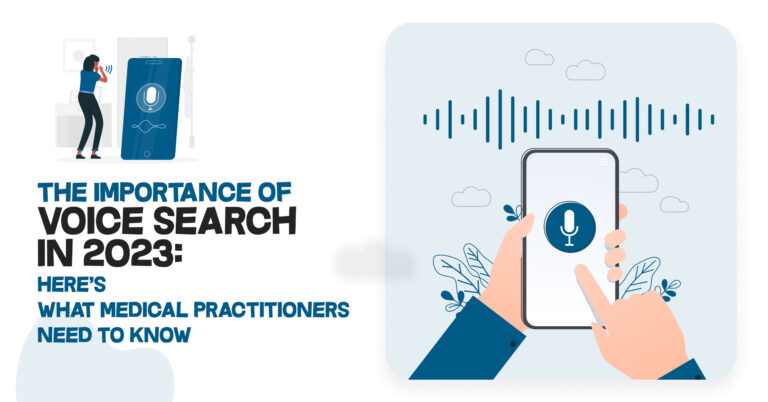
The Importance of Voice Search in 2023: Here’s What Medical Practitioners Need to Know
In the era of technological advancements, voice search has emerged as a game-changer in the way people access information. With the growing popularity of virtual assistants and smart devices, voice search has become an integral part of our daily lives.
This trend has significant implications for medical practitioners, as it transforms the way patients seek healthcare information. In this article, we will explore the importance of voice search in 2023 and discuss what medical practitioners need to know to adapt to this evolving landscape.
Rise of Voice Search

Voice search has witnessed an unprecedented surge in recent years, with the increasing adoption of voice-activated devices such as smartphones, smart speakers, and wearable gadgets.
The convenience and efficiency offered by voice search have made it a preferred choice for users across various demographics. According to industry reports, by 2023, it is estimated that over 50% of all online searches will be conducted through voice.
Enhanced Patient Engagement

Medical practitioners need to recognize the importance of voice search as a tool for enhancing patient engagement. Patients are increasingly turning to voice-activated devices to seek information about symptoms, conditions, treatment options, and healthcare providers.
By optimizing their online presence for voice search, medical professionals can ensure that their information is readily available to patients seeking guidance and assistance.
Local Search Optimization

Voice search is highly location-centric, as users often rely on it to find healthcare services nearby. Medical practitioners must prioritize local search optimization to ensure their practice is easily discoverable through voice-activated devices. This includes optimizing their websites and online profiles with accurate and up-to-date information, such as addresses, contact details, operating hours, and services offered.
Moreover, claiming and regularly updating their profiles on online directories and review platforms is essential for maintaining a strong online presence.
Structured Data and Schema Markup

To maximize visibility in voice search results, medical practitioners should leverage structured data and schema markup on their websites. Structured data helps search engines better understand the content on a webpage, enabling them to provide more relevant and informative answers to voice queries.
By implementing schema markup, medical professionals can ensure that search engines interpret their data accurately, improving the chances of being featured in voice search results.
Patient Education and Empowerment

Voice search offers medical practitioners an opportunity to educate and empower their patients. By creating high-quality, authoritative content that is optimized for voice search, healthcare providers can position themselves as trusted sources of information.
This can be achieved through blog posts, podcasts, and video content that address frequently asked questions, provide health tips, or explain complex medical concepts in a user-friendly manner. By catering to the needs of voice search users, medical practitioners can build stronger patient relationships and foster a sense of trust.
Adapting to Voice-First Experiences

Medical practitioners must adapt to the voice-first experiences that patients are increasingly seeking.
This includes optimizing their websites for mobile devices, as voice searches are often conducted on smartphones. Ensuring that the website is mobile-friendly, loads quickly, and features easy-to-navigate menus will enhance the user experience for patients accessing information via voice search.
Voice-Activated Health Monitoring

The rise of voice-activated devices opens up new possibilities for remote health monitoring and telemedicine. Medical practitioners can leverage voice technology to develop applications or integrations that enable patients to monitor their vital signs, track medication schedules, or receive personalized health recommendations through voice commands.
Embracing these innovations can revolutionize patient care and make healthcare services more accessible and convenient.
Voice Search Marketing
Voice search for business is an increasingly popular practice, particularly in the medical field where patients use voice-activated technology to locate providers. Healthcare providers should improve local SEO and optimize for conversational keywords to take advantage of this. Featured snippets and mobile-friendly websites increase voice search visibility.
Structured data makes your material easier for search engines to understand. Healthcare practices can increase patient engagement and connect with more patients by implementing voice search for business.
Conclusion
In 2023, voice search has become an indispensable tool for information retrieval, and medical practitioners must recognize its importance. By optimizing their online presence for voice search, prioritizing local search optimization, providing structured data, and creating valuable content, healthcare professionals can stay ahead in this evolving landscape.
Embracing voice-activated technology and adapting to voice-first experiences will not only enhance patient engagement but also contribute to the transformation of healthcare delivery in the digital age.
Search
Recent Post
Categories
- AI in Healthcare
- Content Marketing
- Dental
- dental Digital Marketing
- Google Ads
- Google my business
- Healthcare marketing
- Healthcare SEO
- Internet Marketing Tips
- Lead Generation
- Local SEO
- Patient Satisfaction
- pay per click
- Pharma Marketing
- Social
- Social Media Marketing
- Traffic
- Website
- Website Designing
Contact
Get in Touch With Us
Coimbatore Address
- 21/1, Periasubbanna Gounder Street, K.K.Pudur, Coimbatore, Tamil Nadu 641038.
- 098942 76263
- info@harveehealthcare.com

Chennai Address
- RMZ Millenia Business Park, Level 6, Phase II, Campus 4B Unit 602A, Kandancavadi, Perungudi, Chennai, Tamil Nadu 600096.
- 098942 76263
- info@harveehealthcare.com

Dubai Address
- Umm Sequeim 3, Jumeirah Rd Opposite Burj Al Arab, Villa #1 855 A Dubai.
- info@harveehealthcare.com

United Kingdom Address
- 3/2 Powderhall Rigg Edinburgh, United Kingdom EH7 4GA.
- info@harveehealthcare.com

Copyrights © 2025 harvee.co.uk











Leave a Reply